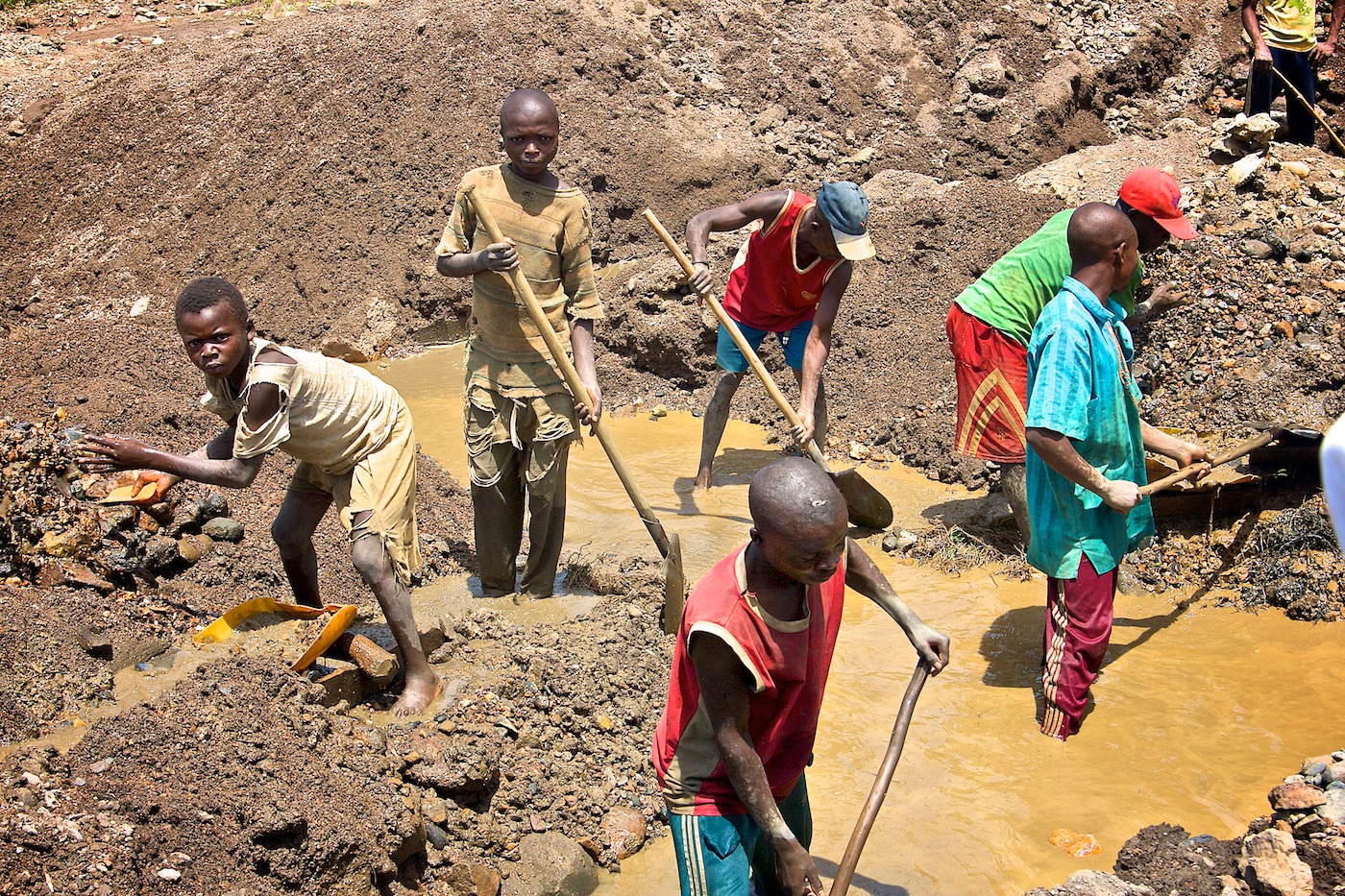Many of us on the African continent clutch our unethically sourced pearls and briefly confront the ugly truths about our consumption, writes Takondwa Semphere. But then we forget.
By Takondwa Semphere, December 6, 2020

2012: Children gold mining in the eastern DRC. (Sasha Lezhnev/Enough Project, Flickr, CC BY-NC-ND 2.0)
It seems that every other month, a different segment of the online population awakens to the horrors of unjust extractive labor on the continent and elsewhere in the world. Clips of young children working in fields and toiling in ruthless mines beam up on our coltan-powered iPhones in punchy, bite-sized expository threads that at once arrest and implicate us.
We clutch our unethically sourced pearls and confront these ugly truths of our consumption. Some of us linger on the news, some share and sign petitions and others, in the sort of torpor that fast-paced timelines tend to inspire, scroll on. For a moment, we rage but in time, another shareable injustice snags at our attention and we forget.
It is easy to forget when the mines are far away from our mobile phones. Many on the African continent who can consume these goods that are manufactured from violently extracted materials are, ourselves, distant from the land. This distance is built into our world, encoded in our economies and facilitated by how we consume.
We pluck our food from shelves instead of branches, and source it from supermarkets rather than unearth it from the soil ourselves. We do not bend to wells or rivers, and our hands do not know the weight of hoes hoisted up into the air and hurled onto the soil. This distance is a part of how we live, and has significant implications on how we seek to make the world more equitable.

2012: A gold dealer in the eastern DRC displays samples of gold. (Sasha Lezhnev/Enough Project, Flickr, CC BY-NC-ND 2.0)
Marx’s theory of alienation offers something of a point of departure when I consider this distance. For those who aren’t familiar, Marx asserts that workers under capitalism are alienated from what they have a hand in making, and consumers are alienated from the goods they buy. This alienation accounts for our seasonal, short-lived shock.
We are estranged from land and so far from the source of products and produce we use that their impact on people and on the environment is outside our view. But it matters to consider the extent and origins of this alienation, especially as we seek to imagine more equitable and just configurations of our world.
Part of this distance can be attributed to our colonized cosmologies. In them, notions of personhood are individualized, and decouple person from place, as if people exist in staunch separation from others and from the earth that they inhabit. In this framework, land is reduced to a commodity.
Where land was once a sociocultural, spiritual, and filial entity, it is increasingly a purely economic one—a thing to be owned, mined, and expropriated, rather than a thing to be revered, protected, or exist in relationship with. This is one of the more insidious causes of our alienation, and is perhaps the one that should cause us the most grief.
Destined for Western Standards & Ideals

Lost City Eatery, Sun City. (South African Tourism via Wikimedia Commons)
A second factor is our discourses of development, which slot us along trajectories that set up Western standards and ideals as our destination. It is necessary for us to problematize these narratives, that are rooted in neoliberal ideas of what “progress” is.
These aspirations hearken back to colonial frameworks of civilization, under which indigenous ideologies were relegated to the realm of dated primordial practices that are supposedly antithetical to modernity.
They do not count our relationship (or lack thereof) with nature. They do not count the impact of our economic activity on our perception of the land.
Capitalism exacerbates this distance. It changes our connection to it from a relationship to a proprietorship. It puts land on a production line, puts tables far from the farm, and siphons water through pipes from distant lakes and rivers.
It transforms us from producers of food to its consumers. It detaches us from the truth and violence that its conveniences necessitate. There is much to revisit, return to, and reconstruct in these ideas.

Farmer in the Mount Kenya region. (Neil Palmer with CIAT via Flickr,CC BY-SA 2.0)
What happens when we reframe our understanding of what land is, beyond asset and capital? Land does, after all, hold significance that transcends discourses of development—land is about origin, about ancestry, and about our very notions of self. Distance from the land, in this sort of ideation, is a distance from ourselves.
Re-centering the earth in our notions of selfhood and community is a necessary decolonial reframing. Until we stop considering the matters of land in such disembodied, impersonal ways, we will continue to exact and remain complicit in the kind of violence that capitalism requires for the maximization of profits.
For as long as land is merely thought of as object, we will continue to slip further into estrangement from it.
The solution to our alienation from land is partly ideological. It entails radically rethinking our world, calling what we consider normative into question and returning to ways of being that we were asked to shun.
It means reconsidering our cosmologies and our theories of not only who, but what has life and is worthy of dignity, and reconfiguring our understanding of personhood as it relates to nature and nature as it relates to personhood. It means acknowledging that our relationship to land informs our relationships to each other and to ourselves.
We need to be able to consider alternative possibilities of living with the earth on this continent. If there is not a restoration of notions of land that do not regard it merely as a thing to be transformed for capitalist gains, our forgetting will continue. Part of the answer to this lies in centering those of us who are closest to the earth—who are not in suits in big boardrooms in tall buildings.
Those who are on the outskirts—who do the least damage to the earth and bear the greatest brunt of its degradation. It means forsaking our colonial notions of modernity and turning toward rurality to learn from those whose very survival entails that they live and work in tandem with the earth they inhabit. It is a shirking of systems that demand that we think of land as outside of ourselves.
The land is ours, and it is us.
Takondwa Semphere is a Malawian writer based in Johannesburg, where she spends her time teaching African Studies.
(Sources: Consortium News - republished under a creative commons license from Africa is a Country)












Đăng nhận xét